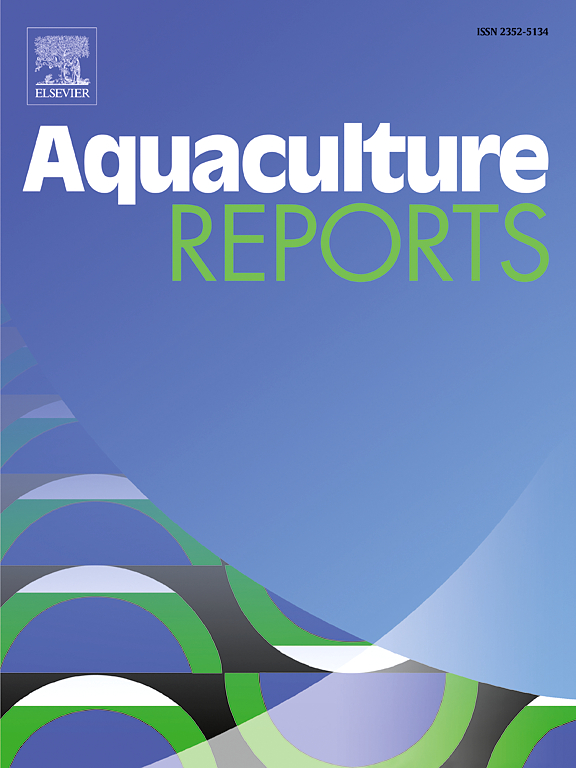音乐富集对小型观赏鱼福利的影响
IF 3.2
2区 农林科学
Q1 FISHERIES
引用次数: 0
摘要
听觉富集是一种新兴的提高观赏鱼福利的方法,但其效果尚不清楚。本研究评估了音乐风格和节奏如何影响两种模式物种:斑马鱼(Danio rerio)和孔雀鱼(Poecilia reticulata)压力相关行为和皮质醇分泌。鱼(n = 4 × 3 /种)连续5天(4 小时/天)暴露于四种听觉处理中的一种-慢节奏钢琴(SP, 40-65 bpm),快节奏钢琴(FP, 150-210 bpm),慢节奏古筝(SG),快节奏古筝(FG) -或沉默(对照组)。从15分钟的录像中量化积极行为(触摸水面、跟随、徘徊)和消极行为(冻结、攻击、冲刺)。采用ELISA法测定全身皮质醇浓度。音乐丰富显著影响行为反应和皮质醇水平(方差分析,p <; 0.05)。在斑马鱼中,SP和SG促进积极行为,FP和FG增加消极行为;与对照组相比,SG单独显著降低皮质醇。在孔雀鱼中,FP、SG和FG增加了积极行为;SG减少了消极行为;所有音乐疗法都能显著降低皮质醇水平。两种物种的新型水箱测试性能均未受影响。总的来说,慢节奏的古筝音乐发挥了最强的抗焦虑作用,尤其是在孔雀鱼身上。我们的结论是,慢古筝音乐的播放提供了一种实用的,非侵入性的方法来减轻压力,提高观赏鱼的福利。本文章由计算机程序翻译,如有差异,请以英文原文为准。
Effects of music enrichment on the welfare of small ornamental fishes
Auditory enrichment is an emerging method to enhance the welfare of ornamental fish, yet its effects remain poorly understood. This study evaluated how music style and tempo influence stress-related behaviors and cortisol secretion in two model species: zebrafish (Danio rerio) and guppies (Poecilia reticulata). Fish (n = 4 × 3 per species) were exposed for five consecutive days (4 h/day) to one of four auditory treatments—slow-tempo piano (SP, 40–65 bpm), fast-tempo piano (FP, 150–210 bpm), slow-tempo guzheng (SG), fast-tempo guzheng (FG)—or to silence (control). Positive behaviors (touching the water surface, following, wandering) and negative behaviors (freezing, aggression, sprinting) were quantified from 15-min video recordings. Whole-body cortisol concentrations were measured using ELISA. Music enrichment significantly affected both behavioral responses and cortisol levels (ANOVA, p < 0.05). In zebrafish, SP and SG promoted positive behaviors, whereas FP and FG increased negative behaviors; SG alone significantly lowered cortisol relative to the control. In guppies, FP, SG, and FG increased positive behaviors; SG reduced negative behaviors; and all music treatments significantly decreased cortisol levels. Novel tank test performance was unaffected in either species. Overall, slow-tempo guzheng music exerted the strongest anxiolytic effect, particularly in guppies. We conclude that playback of slow guzheng music offers a practical, non-invasive approach to reduce stress and improve welfare in ornamental fish housed in barren aquaria.
求助全文
通过发布文献求助,成功后即可免费获取论文全文。
去求助
来源期刊

Aquaculture Reports
Agricultural and Biological Sciences-Animal Science and Zoology
CiteScore
5.90
自引率
8.10%
发文量
469
审稿时长
77 days
期刊介绍:
Aquaculture Reports will publish original research papers and reviews documenting outstanding science with a regional context and focus, answering the need for high quality information on novel species, systems and regions in emerging areas of aquaculture research and development, such as integrated multi-trophic aquaculture, urban aquaculture, ornamental, unfed aquaculture, offshore aquaculture and others. Papers having industry research as priority and encompassing product development research or current industry practice are encouraged.
 求助内容:
求助内容: 应助结果提醒方式:
应助结果提醒方式:


